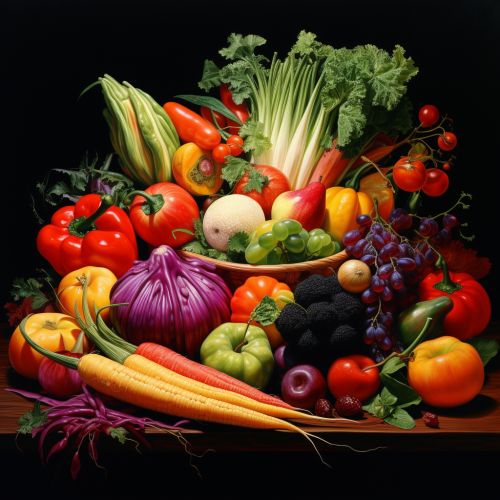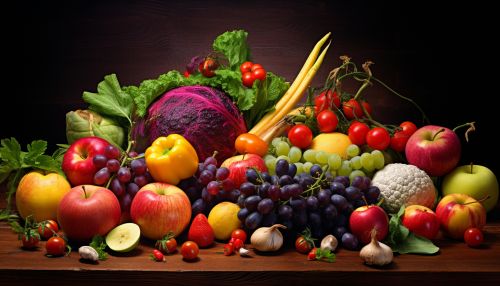Antioxidants in food
Introduction
Antioxidants are compounds that inhibit oxidation, a chemical reaction that can produce free radicals, thereby leading to chain reactions that may damage the cells of organisms. Antioxidants are widely used in dietary supplements and have been investigated for the prevention of diseases such as cancer, coronary heart disease and even altitude sickness. This article will focus on the role of antioxidants in food, their types, sources, benefits, and the science behind their function.


Types of Antioxidants in Food
There are several types of antioxidants found in food. These include vitamin C, vitamin E, beta-carotene, lycopene, lutein, zeaxanthin, and selenium. Each of these antioxidants has a unique mechanism of action and plays a vital role in combating oxidative stress.
Vitamin C
Vitamin C, also known as ascorbic acid, is a water-soluble vitamin and a potent antioxidant. It is essential for the biosynthesis of collagen, L-carnitine, and certain neurotransmitters. Vitamin C is also involved in protein metabolism.
Vitamin E
Vitamin E is a fat-soluble antioxidant that stops the production of reactive oxygen species formed when fat undergoes oxidation. Scientists are investigating whether vitamin E might help prevent or delay the chronic diseases associated with free radicals.
Beta-Carotene
Beta-carotene is a precursor to vitamin A and is found in many fruits, vegetables, and whole grains. It functions as an antioxidant and an immune system booster.
Lycopene
Lycopene is a bright red carotene and carotenoid pigment and phytochemical found in tomatoes and other red fruits and vegetables. It is an antioxidant that protects the body from damage caused by free radicals.
Lutein and Zeaxanthin
Lutein and zeaxanthin are carotenoids found in the retina of the eye. They function as antioxidants and protect the eye from damage caused by free radicals.
Selenium
Selenium is a trace mineral that is essential to good health but required only in small amounts. Selenium is incorporated into proteins to make selenoproteins, which are important antioxidant enzymes.
Sources of Antioxidants in Food
Antioxidants are abundant in fruits and vegetables, as well as in other foods including nuts, wholegrains and some meats, poultry and fish. The list below describes food sources of common antioxidants.
Vitamin C
Good sources of vitamin C include fruits and vegetables, particularly citrus fruits, berries, bell peppers, and dark green leafy vegetables.
Vitamin E
Good sources of vitamin E include vegetable oils, nuts and seeds, green leafy vegetables, and fortified cereals.
Beta-Carotene
Good sources of beta-carotene include brightly colored fruits and vegetables, such as carrots, peas, spinach, and mangoes.
Lycopene
Good sources of lycopene include tomatoes, watermelon, pink grapefruit, apricots, and pink guavas.
Lutein and Zeaxanthin
Good sources of lutein and zeaxanthin include green leafy vegetables, corn, eggs, and oranges.
Selenium
Good sources of selenium include brazil nuts, fish, shellfish, red meat, grains, eggs, chicken, liver, and garlic.
Benefits of Antioxidants in Food
Antioxidants in food offer numerous health benefits. They protect our cells from damage caused by potentially harmful molecules known as free radicals. When the body's cells use oxygen, they naturally produce free radicals which can cause damage. Antioxidants act as "free radical scavengers" and hence prevent and repair damage done by these free radicals. Health problems such as heart disease, macular degeneration, diabetes, and cancer are all contributed by oxidative damage.
The Science Behind Antioxidants
The body uses antioxidants to stabilize the free radicals. This keeps them from causing damage to other cells. Antioxidants can protect and reverse some of the damage. They also boost the immune system and help prevent disease.
